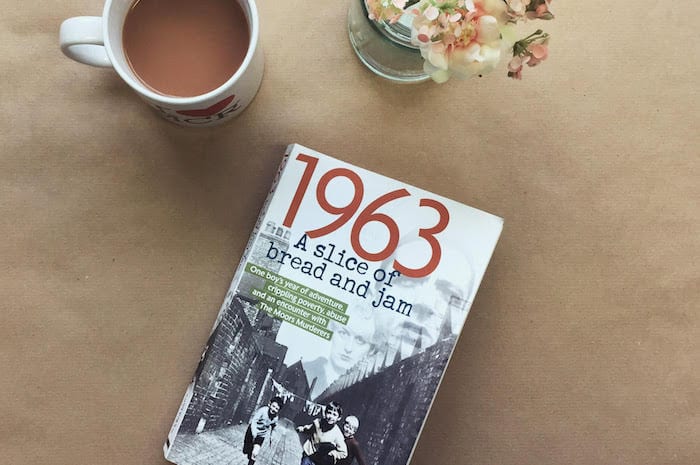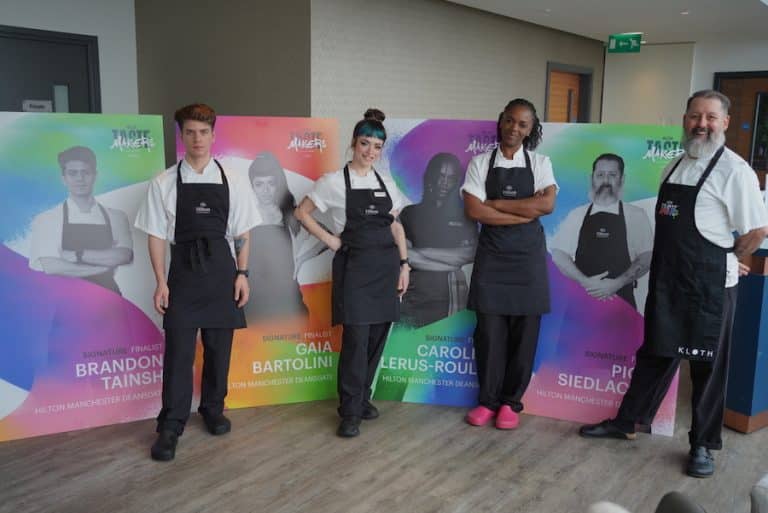MancBook Review: 1963 A Slice of Bread and Jam by Tommy Rhattigan
- Written by Yvonne Goldsmith-Rybka
- Last updated 8 years ago
- Culture

In the words of a certain Mancunian: “There’s more to life than books, you know. But not much more.”
Morrissey could be right. So we’ve taken a leaf out of his book and started our very own book club. But not just any old books. Up for review are those written by Manchester authors (born and bred, adopted, dead or alive) or set in our fair city. Welcome to MacBook Club.
We’re starting with 1963 A Slice of Bread and Jam by Tommy Rhattigan (or Rattigan, it varies), which has been receiving rave reviews since it was published by Mirror Books earlier this year.
What’s it all about?
1963 was the year the UK had one of its worst winters in living memory. It was so cold lakes and rivers froze. Ian Brown and Johnny Marr were born. Manchester was going Beatles mad and George Best made his debut for United.
The book tells the story of a year in the life of seven-year old Tommy growing up with poverty and neglect amid the derelict houses of pre-Crescents Hulme.
One of thirteen children of an Irish traveller family, Tommy forges strong bonds with his closest siblings Martin and Bernie as they beg and steal their way through life like it’s the most natural thing in the world. Their abusive, alcoholic and negligent parents encourage their children to steal and think nothing of the fact that they spend their nights out on the streets.
1963 was the year of his encounter with Moors Murderers, Myra Hindley and Ian Brady. Lured to their house with a promise of bread and jam, Tommy was moments away from becoming their sixth victim. Breaking his self-imposed fifty year silence, this is his story.
What do we think?
There is a lot of dark comedy contained in Tommy’s adventures, with strong Irish accents adding to the whole colourful package. A run-in with their dead ‘nan’ and the chapter entitled A Win on the Bingo particularly had us tittering. But there is also a lot of brutal and gritty heart-wrenching content told through the eyes of this innocent seven-year old not fully comprehending the severity of his situation.
What we struggled with was the amount of detail in the author’s memoirs. He probably couldn’t write at the time and therefore wouldn’t have kept a diary. And where most of us might struggle to remember many incidents of note at the age of seven, Tommy has an abundance of detailed anecdotes that may well be true but feel rather exaggerated or have more than a dash of poetic license thrown in.
The fact the book has been sold on Tommy’s run-in with the Moors Murderers wears a little thin. What a story that is for sure and it’s where the book really steps up a notch. But is there enough here for over 300 pages?
What the book does demonstrate, however, is the fact his very way of life and his upbringing, that inbuilt sense of survival, probably went a long way in giving him the instinct to get out when he could. And that is truly remarkable.
There is talk of a sequel. There is a lot many people who read this book will want to know. What became of Tommy and his siblings? Did the younger ones stay together when they were put into care or did they all lose touch at the end of that fateful year? Did they help him recall the events described in this book?
In the end
Tommy Rhattigan was the one that got away. Unfortunately, so did the book. Although it’s funny, brutal and honest in parts, it’s a collection of anecdotes that could be read in any order. A combination of this book, and the proposed sequel, may have worked better.
- This article was last updated 8 years ago.
- It was first published on 15 March 2017 and is subject to be updated from time to time. Please refresh or return to see the latest version.
Did we miss something? Let us know: [email protected]
Want to be the first to receive all the latest news stories, what’s on and events from the heart of Manchester? Sign up here.
Manchester is a successful city, but many people suffer. I Love Manchester helps raise awareness and funds to help improve the lives and prospects of people across Greater Manchester – and we can’t do it without your help. So please support us with what you can so we can continue to spread the love. Thank you in advance!
An email you’ll love. Subscribe to our newsletter to get the latest news stories delivered direct to your inbox.
Got a story worth sharing?
What’s the story? We are all ears when it comes to positive news and inspiring stories. You can send story ideas to [email protected]
While we can’t guarantee to publish everything, we will always consider any enquiry or idea that promotes:
- Independent new openings
- Human interest
- Not-for-profit organisations
- Community Interest Companies (CiCs) and projects
- Charities and charitable initiatives
- Affordability and offers saving people over 20%
For anything else, don’t hesitate to get in touch with us about advertorials (from £350+VAT) and advertising opportunities: [email protected]

Hilton Manchester Deansgate’s superstar chefs shine on the world stage

Stalybridge to get multi-million pound makeover of public spaces

Review: The Engagement Party at Queen Elizabeth Hall ‘is full of immersive fun’

Piehard: where to get the best pies in and around Manchester

















